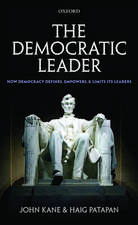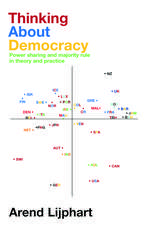Democratic Theory and Technological Society
Autor Richard B. Day, Ronald Beiner, Joseph Masciullien Limba Engleză Paperback – 31 aug 1988
Preț: 369.73 lei
Nou
Puncte Express: 555
Preț estimativ în valută:
70.75€ • 74.05$ • 58.88£
70.75€ • 74.05$ • 58.88£
Carte tipărită la comandă
Livrare economică 31 martie-14 aprilie
Preluare comenzi: 021 569.72.76
Specificații
ISBN-13: 9780873324489
ISBN-10: 087332448X
Pagini: 370
Dimensiuni: 152 x 229 x 20 mm
Greutate: 0.45 kg
Ediția:1
Editura: Taylor & Francis
Colecția Routledge
Locul publicării:Oxford, United Kingdom
ISBN-10: 087332448X
Pagini: 370
Dimensiuni: 152 x 229 x 20 mm
Greutate: 0.45 kg
Ediția:1
Editura: Taylor & Francis
Colecția Routledge
Locul publicării:Oxford, United Kingdom
Cuprins
CONTENTS: Introduction Part I:The Reign of Techne Chapter 1: Political Imagination in a Technical Age Willem H. Vanderburg Chapter 2: Marx and Lucács on Technology and the "Value" of Freedom Richard B. Day Chapter 3: Languages, Techniques, Rationalities Dusan Pokorny Chapter 4: Technology and the Problem of Democratic Control: The Contribution of Jürgen Habermas Marie Fleming Chapter 5: Shades of Optimism: Soviet Views on Science and Morality Lászlo G. Jóbbágy Part II: Prospects for Democracy Chapter 6: Liberal Democracy and the Problem of Technology Jerry Weinberger Chapter 7: Rousseau Versus Instant Government: Democratic Participation in the Age of Telepolitics Joseph Masciulli Chapter 8: Anarchism and Technology Frank Harrison Chapter 9: Hegel and Marx: Perspectives on Politics and Technology Richard B. Day Chapter 10: Political Technology, Democracy and Education: John Dewey's Legacy Frank J. Kurtz Chapter 11: Dahl, Democracy and Technoogy H.D. Forbes Part III: Pondering Our Destiny Chapter 12: Politics and Progress in Heidegger's Philosophy of History W.R. Newell Chapter 13: Fire Alarm: Water Benjamin's Critique of Technology Michael Löwy Chapter 14: Consent to the University: Simone Weil and the Natural Ground for Technological Choice Gary A. Lewis Chapter 15: George Grant on Technological Imperatives Edward Andrew Chapter 16: Action into Nature: Hannah Arendt's Reflections on Technology Barry Booper Chapter 17: Ethics and Technology: Hans Jonas' Theory of Responsibility Ronald Beiner
Notă biografică
Richard B. Day, Ronald Beiner, Joseph Masciulli
Descriere
What are the chief challenges posed to contemporary democracy by modern technology, and how can democratic theory best respond to, or at least reflect on, those challenges? Inhabiting the kind of technologically advanced era in which we live, what sources are available within political theory for theoretical insight concerning the problem of democratic engagement with technology? The purpose of this volume is to canvas a broad range of theorists and theoretical traditions in order to address these questions, including Hegel and Marx, Rousseau and John Dewey, Heidegger and Simone Weil, Habermas and Walter Benjamin, Hannah Arendt and Hans Jonas. Commentaries on all these important thinkers -- focused on the issue of contemporary technology as posing unique social and political challenges for democratic political life -- yields rich and ambitious resources for theoretical reflection.

















